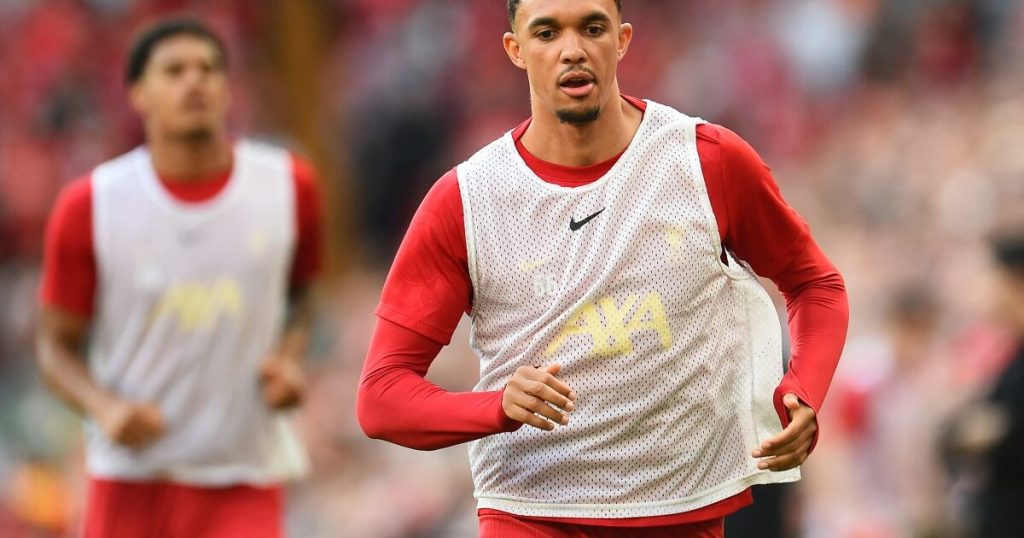The atmosphere at Anfield was thick with mixed emotions during Liverpool’s recent 2-2 draw against Arsenal. The primary focus was not solely on the game itself, but on the reception given to departing right-back Trent Alexander-Arnold. Alexander-Arnold, a product of Liverpool’s youth academy and a key figure in their recent successes, had announced his intention to leave the club at the end of the season, with Real Madrid widely expected to be his destination. This announcement preceded his first appearance back at Anfield in front of the home crowd, and the reception he received was a blend of applause and audible jeers, particularly when he was in possession of the ball after coming on as a substitute. This mixed reaction underscored the complex feelings surrounding his exit, a departure that marks the end of an era for both the player and the club.
The decision to leave his boyhood club was undoubtedly a difficult one for Alexander-Arnold, and the jeers from a section of the Anfield faithful added another layer of complexity to his final appearances in a Liverpool shirt. Teammates, including Andrew Robertson, publicly expressed their support for Alexander-Arnold, highlighting the personal toll the situation had taken on him. Robertson acknowledged the fans’ right to express their feelings but emphasized the difficulty of seeing a close friend and respected teammate subjected to such negativity. He underlined Alexander-Arnold’s contributions to the club and the personal bond they shared, expressing sadness at his departure. This public display of support reflected the close-knit nature of the Liverpool squad and the respect Alexander-Arnold commanded within the dressing room.
Liverpool manager Arne Slot found himself in a delicate position, needing to balance his support for Alexander-Arnold with the understanding of the fans’ emotions. He acknowledged the divided opinions within the fanbase, noting both the cheers and the boos that greeted the player. Slot reiterated his commitment to supporting his players and emphasized the importance of respecting the varying perspectives on Alexander-Arnold’s departure. He refused to condemn those who booed, but equally highlighted the support the player received from other sections of the crowd. This measured response reflected the manager’s desire to navigate a sensitive situation without further inflaming tensions.
Slot’s pragmatic approach extended to his team selection decisions. He started the game with Conor Bradley, a promising young right-back viewed as Alexander-Arnold’s potential successor. This decision suggested a forward-looking approach, while also potentially mitigating some of the fan unrest by showcasing the club’s future plans. However, Slot remained open to utilizing Alexander-Arnold in the remaining matches, prioritizing the team’s performance and results above all else. He stated that he would select the team he felt gave Liverpool the best chance of winning, regardless of external pressures. This pragmatic stance underscored the manager’s focus on achieving the best possible outcome for the team.
Alexander-Arnold’s departure to Real Madrid evokes memories of previous high-profile exits from Anfield to the Bernabeu, including those of Steve McManaman and Michael Owen. These departures, even after many years, haven’t been entirely forgotten by the Liverpool faithful, and there are lingering sentiments attached to players choosing to join the Spanish giants. This historical context adds another dimension to the reaction to Alexander-Arnold’s decision, resonating with past experiences of losing key players to the same club. It highlights a sensitivity within the fanbase regarding transfers to Real Madrid, a club often perceived as a direct rival on the European stage.
Former Liverpool defender Jamie Carragher echoed Robertson’s sentiments, expressing his surprise at the extent of the negative reaction towards Alexander-Arnold. He acknowledged the fans’ disappointment with the situation but argued that no player representing Liverpool deserved to be booed. This perspective, coming from a respected former player and a prominent voice within the Liverpool community, added weight to the argument against the booing. It underscored the importance of supporting players who wear the Liverpool shirt, regardless of their future intentions, and highlighted the potential damage such negativity can inflict on both the individual and the club. The overall situation surrounding Alexander-Arnold’s departure and the subsequent fan reaction exposed the raw emotions involved when a homegrown talent chooses to move on, particularly to a club with a history of attracting Liverpool players. It also showcased the complex dynamics between players, fans, and the club itself, as Liverpool navigates this transitional period.














